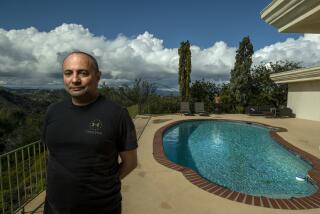Message to Russian oligarchs: Your moneyâs just as safe at home
Itâs been a rough week for Russian oligarchs, with the apparent suicide of exiled Kremlin critic Boris Berezovsky as well as a Eurozone rescue of Cyprus expected to come largely at the expense of Russian high rollers who stashed their wealth in the islandâs now insolvent banks.
The headline-grabbing developments have little to do with each other beyond perceived comeuppance for Russian robber barons. But together they provide a cautionary tale for those who have amassed dubious fortunes about misplaced confidence that their money is safer in the West than in Mother Russia.
Berezovsky, who was found dead Saturday in a bathroom of his home outside London, joins a list of rich Russian exiles who have met an untimely end after running afoul of President Vladimir Putin. Ex-KGB agent Alexander Litvinenko died in 2006, poisoned by polonium slipped into his tea at a London hotel. Badri Patarkatsishvili, a business partner of Berezovsky, died of what was said to be a heart attack at age 52 at his British estate in 2008. Alexander Perepilichny, who had exposed tax fraud and money laundering among high-ranking Moscow figures, was found dead at his villa in southern England in November of still-undetermined causes at age 44.
Some associates of Berezovsky dismissed as unthinkable the initial determination by British forensic investigators that the oligarch took his own life, although others who had been in touch recently described him as deeply depressed over his fallen fortunes. Once worth at least $3 billion with holdings in oil, automobiles and the Aeroflot aviation network, Berezovsky was selling off paintings and real estate in recent months to make ends meet after a costly divorce and failed lawsuits.
Few tears were shed in Russia on learning that the 67-year-old Berezovsky had apparently hung himself in despair over his lost status in the 13 years since he fled his homeland. Putin spokesman Dmitry Peskov told Russian media that âthe news of anyoneâs death is always sadâ but then spread reports that the morose tycoon had appealed to Putin for âforgivenessâ and a safe return to Russia. Those claims of contrition by the brash and combative exile set off conspiracy theorists who believe that Berezovskyâs death was somehow the handiwork of Kremlin agents.
Neither are the sympathies of average Russians thought to be stirred by the so-called haircut about to be sustained by Russian and other depositors who hold more than $130,000 in Cypriot tax havens. Russian deposits accounted for about a third of the $89 billion residing in Cypriot banks at last audit, much of it suspected of having been acquired through corrupt transactions or criminal enterprise.
âThis is punitive,â Matthew Rojansky of the Carnegie Endowment for International Peace said of the Cypriot governmentâs planned seizure of unsecured bank deposits to pull together $7.5 billion to qualify for $13 billion from Eurozone partners. âThey wouldnât be punishing the banks if they didnât think they were involved with dirty criminals to begin with.â
Rojansky disparages the depositsâ seizure as âthe deepest kind of hypocrisy and double standard.â He recalled the Gilded Age of U.S. capitalism a century ago when industrialists like Andrew Carnegie -- the namesake benefactor of the Washington think tank where Rojansky is a Russian security analyst -- acquired vast fortunes on the back of underpaid labor, then âlaunderedâ their money by donating it to libraries, foundations and institutions of higher learning.
âThe point here is that if Russians ultimately accept that their fate lies with Russia, that the Berezovsky path is not sustainable ⌠that could lead to positive developments in Russia,â Rojansky said of prospects for cleaning up Russian financial institutions.
Ironically, he observed, the primary benefactor of the Eurozone deposit grab is likely to be Putin, who has been pressing for repatriation of Russian capital from abroad.
âIf there is a lesson that Russian oligarchs should take away, it is probably that there is not any really safe place for your billions,â he said of the deposit expropriations. âThe lesson for wealthy Russians is that you might as well keep your money at home.â
Douglas J. Elliott, a Eurozone expert at the Brookings Institution, likewise sees Russian depositors as easy targets of European officials whose taxpayers are tired of bailing out spendthrift states on the periphery of more fiscally responsible countries like Germany, Austria and the Netherlands.
âThe perception that Cyprus was a tax haven and a place to launder money, and that much of it came from Russian mobsters and oligarchs, politically it was just death,â Elliott said. âThe Europeans would have handled this very differently if that perception hadnât been out there.â
Cypriot banks have been closed since the end of business March 15 to prevent a run on deposits spurred by the surprising decision to tap private accounts. Although banks are expected to reopen Thursday, the government has made it clear that capital controls will be in place to prevent massive withdrawals.
Even if the run can be slowed, âCyprus as a financial center is going to crater,â said Elliott, who predicted that the islandâs economy will shrink by 20% in the next couple of years.
For the Russians, the pain will be shorter-lived, he said, because âthere are lots of places around the world where they can put their money.â
ALSO:
Gay marriage: Where is it legal?
North Korea threatens attacks on U.S., Guam, South Korea
Syrian opposition takes seat at Arab League, seeks Patriot missiles
A foreign correspondent for 25 years, Carol J. Williams traveled to and reported from more than 80 countries in Europe, Asia, the Middle East and Latin America.
More to Read
Sign up for Essential California
The most important California stories and recommendations in your inbox every morning.
You may occasionally receive promotional content from the Los Angeles Times.











